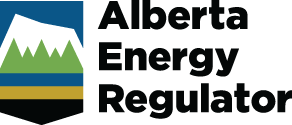Updated December 2022
What is the Alberta Energy Regulator?
This EnerFAQs explains how the Alberta Energy Regulator (AER) ensures safe, efficient, orderly, and environmentally responsible development of energy resources (oil, oil sands, natural gas, coal, and geothermal resources) throughout their life cycle.
Questions:
- What is the Alberta Energy Regulator?
- What does the AER do?
- What does the AER not regulate?
- How does the AER enforce the rules?
- How is the AER structured?
- What is an AER hearing?
- How is the AER funded?
- Additional Information
What is the Alberta Energy Regulator?
The AER provides for the safe, efficient, orderly, and environmentally responsible development of energy resources. This responsibility includes allocating and conserving water resources, managing public lands, and protecting the environment while securing economic benefits for all Albertans.
Energy regulation in Alberta spans over 80 years. Since its beginning in 1938, Alberta’s energy regulator has evolved in response to changes in government legislation, shifts in priorities, and expansion of its regulatory responsibility. The regulator has had many names over the years, including the Petroleum and Natural Gas Conservation Board, the Oil and Gas Conservation Board, the Energy Resources Conservation Board (ERCB), the Alberta Energy and Utilities Board, and now the Alberta Energy Regulator.
The AER was established in 2013 following the passing of the Responsible Energy Development Act and assumed the energy regulatory functions of the ERCB and those held by the then Alberta Environment and Sustainable Resource Development (now Alberta Environment and Protected Areas) related to public lands, water, and the environment.
What does the AER do?
We regulate some of the world’s largest energy resources. It takes a lot of infrastructure to produce, mine, process, recover and move all those resources to markets. We are responsible for regulating energy infrastructure, including pipelines, wells, geothermal facilities (heat or power), gas or oil processing plants and facilities, in situ projects, bitumen upgraders, oil sands mines, and coal mines.
To ensure energy resource activities are safe, environmentally responsible, and actively managed, the Government of Alberta has granted the AER authority to
- review and make decisions on proposed energy developments,
- oversee all aspects of energy resource activities in accordance with government policies,
- regularly inspect energy activities to ensure that all applicable requirements are met,
- penalize companies that fail to comply with AER requirements, and
- hold hearings on proposed energy developments.
The AER is the sole regulator for energy-related developments under the Oil and Gas Conservation Act, Oil Sands Conservation Act, Coal Conservation Act, Geothermal Resource Development Act, and the Pipeline Act. We also have regulatory responsibilities under the Environmental Protection and Enhancement Act (e.g., reclamation and remediation activities), the Water Act, the Public Lands Act and the Mines and Minerals Act.
What does the AER not regulate?
The AER’s responsibilities are limited to activities that relate to oil, bitumen, natural gas, deep geothermal, and coal development. The AER has no authority over any of the following:
- gasoline or other refined petroleum products
- oil and gas pipelines that cross provincial or international borders regulated by the Canada Energy Regulator
- geothermal resource development above the base of groundwater protection
- electricity generation except that generated from geothermal resources
- electricity and power distribution – the price of natural gas and electricity are regulated by the Alberta Utilities Commission (AUC)
- gas utility pipelines regulated by the AUC – the AER does inspect these pipelines and provide incident response on the commission’s behalf
How does the AER enforce the rules?
With additional authority comes additional enforcement tools. Companies allowed to develop Alberta’s energy resources must follow all rules, regulations, and requirements. If they fail, substantial consequences will result.
The AER’s enforcement tools can include
- more frequent and detailed inspections,
- more stringent planning requirements,
- enforcement orders,
- shutting down operations,
- the levying of administrative penalties, and
- prosecution.
Another aspect of our work as a regulator is to keep Albertans informed about the energy industry’s record in meeting our requirements. Our compliance assurance program describes how we ensure compliance, and our compliance dashboard gives insight into how the AER responds to and investigates incidents, enforces the rules, and penalizes companies when the rules are not being followed. See EnerFAQs Inspections and Enforcement of Energy Developments in Alberta for more information
How is the AER structured?
A board of directors sets the general direction of our business affairs and is charged with approving regulatory changes and setting performance expectations for the AER and its chief executive officer (CEO). In this way, the AER’s board operates as a “corporate-style” board and is not involved in day-to-day operations and decisions.
The CEO, who reports directly to the board chair, is accountable for day-to-day operations, which include receiving and making decisions on applications, monitoring and investigating energy resource activities for compliance, and closure of energy developments, including remediation and reclamation.
Hearing commissioners represent another important part of the AER’s structure. Reporting to a chief hearing commissioner, commissioners are responsible for conducting hearings into energy applications and regulatory appeals. As independent adjudicators, only the Court of Appeal of Alberta may review their decisions. Hearing commissioners are also involved in developing the organization’s hearing procedures and rules and other day-to-day operations.
What is an AER hearing?
An AER hearing is a court-like proceeding about issues related to an application or regulatory appeal and is open to the public. Parties make their case by providing evidence, asking questions of other parties, and making final arguments. A hearing may be oral, electronic, or written. See the EnerFAQs Having Your Say at an AER Hearing for more information.
The AER has discretion whether to conduct a hearing or not when considering an application. In the case of a regulatory appeal, the AER must hold a hearing unless the issue is otherwise resolved through alternative dispute resolution.
How is the AER funded?
As of 2013, the Government of Alberta announced that the AER would be funded entirely by industry. Other regulatory agencies in Canada use this model, such as the AUC and the British Columbia Oil and Gas Commission.
The AER’s budget is established through a formal process between the Government of Alberta’s Treasury Board and the AER. Once the Government of Alberta approves the budget, the AER collects this amount is from industry through an administrative fee (levy).
Regardless of the funding model, industry is held accountable for its actions and shares the responsibility of ensuring sustainable energy development.
Additional Information
For more information on the AER and its processes or if you wish to speak with your local field centre or have general questions about energy resource development in Alberta, contact the AER’s Customer Contact Centre: Monday to Friday (8:00 a.m. to 4:30 p.m.) at 1-855-297-8311 (toll free).
This document is part of the EnerFAQs series, which explains the AER’s regulations and processes relating to specific energy issues. Please visit www.aer.ca to read more of the EnerFAQs series.
Every year the AER collects, compiles, and publishes a large amount of technical data and information about Alberta’s energy development and resources for use by industry and the public. This includes raw data, statistics, hearing materials, and information on regulations, policies, and decisions.
Publications may be downloaded free of charge from the AER website (www.aer.ca) or made available through the Products and Services Catalogue by contacting Data & Information Services (email: @email).
AER Head Office
Suite 1000, 250 – 5 Street SW
Calgary, Alberta T2P 0R4
@email
1-855-297-8311 (toll free)
Energy and Environmental 24-hour Response Line (emergencies and complaints): 1-800-222-6514 (toll free)


